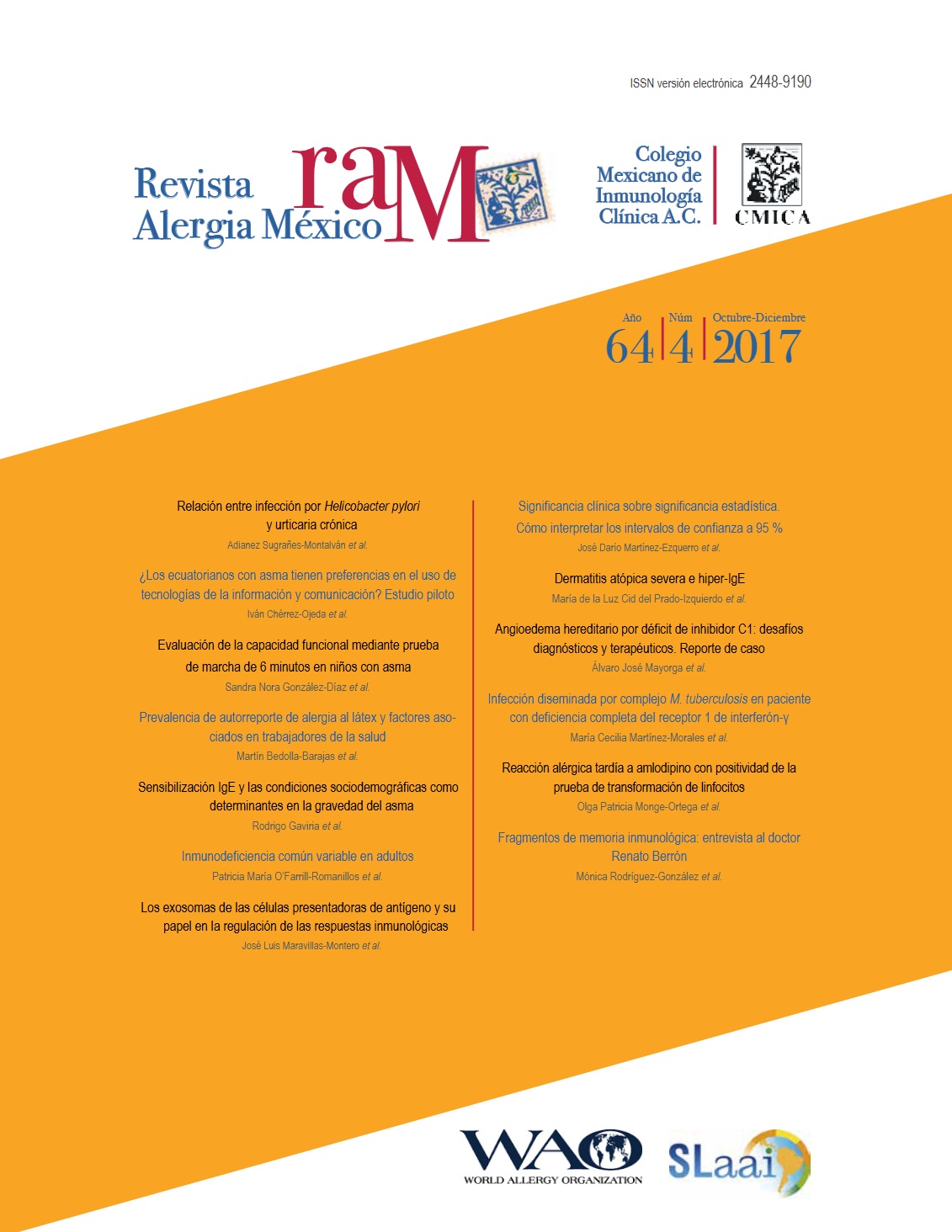Abstract
Background: Hereditary angioedema is a disease which manifests itself with episodes of spontaneous edema on skin, mucosal and airway. Treatment includes acute and prophylactic approach to minimize the attacks and severity. In many parts of the world, androgen derivatives, antifibrinolytic and fresh frozen plasma are the therapies available for prophylaxis.
Case report: 16 years old teenager without history of immune decease, has in the course of 1-year repetitive episodes of painless, non-pruritic angioedema, does not respond to antihistamine therapy, corticosteroids or adrenaline; fresh frozen plasma is applied in 1 occasion exacerbating episode with severity. The diagnosis is delayed because of the unavailability of the study in the country, so it is shipped abroad confirming the deficit of C1 Inhibitor (7.1 μg/mL). Initiating prophylactic therapy with Danazol, with subsequent episodes decreased.
Conclusion: The delay diagnosis involves considerable risk in these patients; the importance of long-term prophylactic treatment is ratified in the use of androgens, being as an available option in developing countries.References
Betschel S, Badiou J, Binkley K, Hébert J, Kanani A, Keith P, et al. Canadian hereditary angioedema guideline. Allergy Asthma Clin Immunol. 2014;10(1):50. DOI: http://dx.doi.org/10.1186/1710-1492-10-50
Henao MP, Kraschnewski JL, Kelbel T, Craig TJ. Diagnosis and screening of patients with hereditary angioedema in primary care. Ther Clin Risk Manag. 2016;12:701-711. DOI: http://dx.doi.org/10.2147/TCRM.S86293
Dulfary-Sánchez M, Cuervo J, Rave D, Clemen G, Yepes-Núñez JJ, Ortiz-Reyes B, et al. Angioedema hereditario en Medellín, Colombia: evaluación clínica y de la calidad de vida. Biomédica. 2015;35(3):419-428. DOI: http://dx.doi.org/10.7705/biomedica.v35i3.2417
Navarro-Ruiz A, Crespo-Diz C, J. Poveda-Andrés JL, Cebollero-de-Torre A. Algoritmo de diagnóstico y tratamiento del angioedema hereditario como herramienta para su manejo. Farm Hosp. 2013;37(6):521-529. DOI: http://dx.doi.org/10.7399/FH.2013.37.6.980
Farkas H, Martínez-Saguer I, Bork K, Bowen T, Craig T, Frank M, et al. International consensus on the diagnosis and management of pediatric patients with hereditary angioedema with C1 inhibitor deficiency. Allergy. 2017;72(2):300-313. DOI: http://dx.doi.org/10.1111/all.13001
Vives-Toledo R, Sorlí-Guerola JV, Sierra-Santosa L, García-Ribes M. Angioedema hereditario. Rev Clin Med Fam. 2015;8(1):62-65. DOI: http://dx.doi.org/10.4321/S1699-695X2015000100008
Zuraw BL, Banerji A, Bemstein JA, Busse PJ, Christiansen SC, Davis-Lorton M, et al. US Hereditary Angioedema Association Medical Advisory Board 2013 recommendations for the management of hereditary angioedema due to C1 inhibitor deficiency. J Allergy Clin Imunol Pract. 2013;1(5):458-467. DOI: http://dx.doi.org/10.1016/j.jaip.2013.07.002
Wahn V, Aberer W, Eberl W, Faßhauer M, Kühne T, Kurnik K, et al. Hereditary angioedema (HAE) in children and adolescents-a consensus on therapeutic strategies. Eur J Pediatr. 2012;171(9):1339-1348. DOI: http://dx.doi.org/10.1007/s00431-012-1726-4
Viktória-Kőhalmi K, Veszeli N, Zotter Z, Csuka D, Benedek S, Imreh E, et al. The effect of long-term danazol treatment on haematological parameters in hereditary angioedema. Orphanet J Rare Dis. 2016;11:18. DOI: http://dx.doi.org/10.1186/s13023-016-0386-2
Zuraw BL. Hereditary Angioedema. N Engl J Med. 2008;359:1027-1036. DOI: http://dx.doi.org/10.1056/NEJMcp0803977
Agostoni A, Aygören‐Pürsün E, Binkley KE, Blanch A, Bork K, Bouillet L, et al. Hereditary and acquired angioedema: problems and progress: proceedings of the third C1 esterase inhibitor deficiency workshop and beyond. J Allergy Clin Immunol. 2004;114(3 Suppl):S51-S131. DOI: http://dx.doi.org/10.1016/j.jaci.2004.06.047
Pappalardo E, Cicardi M, Duponchel C, Carugati A, Choquet S, Agostoni A, et al. Frequent de novo mutations and exon deletions in the C1 inhibitor gene of patients with angioedema. J Allergy Clin Immunol. 2000;106(6):1147-1154. DOI: http://dx.doi.org/10.1067/mai.2000.110471
Cicardi M, Bork K, Caballero T, Craig T, Li HH, Longhurst H, et al. Evidence-based recommendations for the therapeutic ma¬nagement of angioedema due to hereditary C1- inhibitor deficiency: consensus report of an International Working Group. Allergy. 2012;67(2):147-157. DOI: http://dx.doi.org/10.1111/j.1398-9995.2011.02751.x

This work is licensed under a Creative Commons Attribution-NonCommercial 4.0 International License.
Copyright (c) 2017 Revista Alergia México

